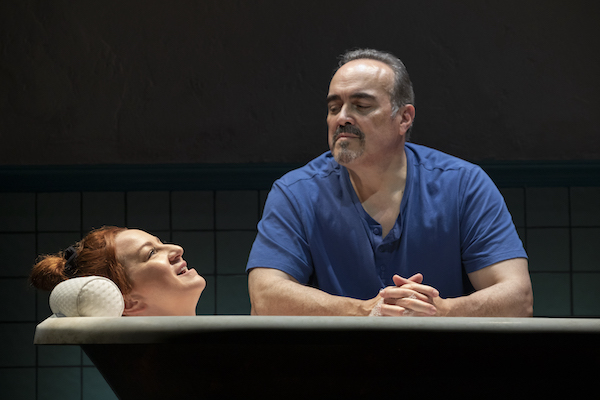Theater Reviews: On Broadway — Tom Stoppard’s “Leopoldstadt” and Martyna Majok’s “Cost of Living”
Two stirring dramas hit Broadway, one weightier than the next
By Christopher Caggiano
As the Broadway season kicks into gear, we’re starting to see the usual collection of jukebox musicals (A Beautiful Noise and & Juliet) and prestige revivals with big-name stars (The Piano Lesson with Samuel L. Jackson). But we’re also seeing several serious plays with producers bold enough to make a go without big Hollywood names or branded song catalogs.

Faye Castelow (Gretl) and David Krumholtz (Hermann) in Leopoldstadt. Photo: Joan Marcus.
Sure, these plays come with pedigrees. Tom Stoppard’s Leopoldstadt comes direct from London where it won the 2021 Olivier for Best Play, not to mention the name recognition of one of our greatest living playwrights (An Arts Fuse review of the script and a biography of Stoppard). And Martyna Majok’s Cost of Living won the 2018 Pulitzer Prize after an Off-Broadway run. But there’s not a marquee name to be found in either cast list, and autumn is a notoriously difficult time for plays to gain any kind of financial foothold.
Strangely enough, Leopoldstadt is breaking box office records at the Longacre. This past week, the play pulled in over $1 million in ticket sales, at a time when most dramas are lucky to see $300,000. It’s a sweeping play with an enormous cast — 32 people, more than most musicals these days — the kind we don’t see that often on Broadway, especially outside the cosseted confines of the Great White Way’s numerous nonprofits.
Of course, that $1 million take comes in the middle of the Jewish High Holy Days, and Leopoldstadt is Stoppard’s fictional examination of his family history leading up to and just after the Holocaust. I saw the play just after Yom Kippur: there was a palpable sense of connection and collective mourning in the theater. It was one of those synergistic moments that demonstrate the true impact of live theater.
Leopoldstadt is a late career triumph for Stoppard, devoid of the schoolboy trickery and wordplay or his earlier works. The script tells a straightforward and heartbreaking story of the Merz and Jakobovicz families, both Jewish, comfortably upper middle class, and firmly ensconced in the worlds of commerce and academia. Or, at least, that’s what they think in 1899, at the start of the play.

Joshua Satine (Young Jacob) in Leopoldstadt. Photo: Joan Marcus.
Although the families are Jewish, the play begins at a Christmas party, which the adults deign to celebrate to placate the children. But the festivities also acknowledge that family members have begun to intermarry with gentiles. As events ineluctably progress, they foolishly think assimilation will keep them safe. They see Vienna flourish artistically and economically around them, and they congratulate themselves for being a part of this emergence.
Stoppard’s play is, of course, rife with dramatic irony. We know all too well where this is headed, and there’s an immovable urge to warn these characters, to shake them and make them wake up to the realities around them.
The play is also about memory, remembering who we are and from whom we are descended. At one point, early in the play, the grandmother is looking through a family photo album. She can’t remember who certain people are. “Here’s a couple waving goodbye from the train, but who are they? No idea,” she says. “That’s why they’re waving goodbye. It’s like a second death, to lose your name in a family album.”
The remainder of the play demonstrates the truth of this statement, as we struggle to remember the many characters whom we’ve encountered through the play’s five-decade time span, and bear witness to the varying fates that befall them. Leopoldstadt is not without its flaws. Some of Stoppard’s characterizations are disappointingly broad and blunt. The characters often feel like types rather than people, stand-ins for particular points of view rather than multifaceted beings. As such, there’s a surfeit of speechifying rather than conversation. But somehow these issues don’t rob the play of its power, a slow burn that builds to a shattering denouement.

David Zayas and Katy Sullivan in Cost of Living. Photo: Jeremy Daniel.
Also new to Broadway is playwright Martyna Majok’s 2018 Pulitzer Prize-winning play, Cost of Living. The play’s recognition took some theater insiders by surprise. Sure, the script is strong and affecting. But was it really Pulitzer-worthy?
As the play makes its Broadway bow, it’s clear that the Pulitzer committee chose well. Cost of Living is a drama that calls for patience so that the story and its character can make an impact. It’s a spare play, both in its text and its setting, as if to emphasize that it’s these people that we really need to be focusing on. But, like a haiku, Cost of Living uses restraint to its advantage, allowing the audience to fill in the gaps, to imagine the rich notes that, to borrow a jazz cliché, the creators and cast aren’t playing.
The plot features two story lines that seem only to be thematically connected, until the very end of the proceedings. Princeton graduate student John (played with proud rough edges by Gregg Mozgala) has cerebral palsy and hires recent grad Jess (a vibrant Kara Young) to help him bathe and get dressed in the morning.
In a parallel tale, we have the story of Ani and Eddie, a separated married couple with 20 years of complex feelings to draw on. Ani, played with sharp humor and unrestrained acerbity by Katy Sullivan, has recently been in a debilitating car accident that has left her quadriplegic. The play suggests that the accident may have been Ani’s fault. Eddie, her estranged husband, played with great vulnerability and charm by David Zayas, is caught in a bind: he wants to reconnect with the vulnerable Ani but forge a life of his own.
Cost of Living is nominally about disability, but not just the physical kind. Yes, John and Ani are physically challenged – a term that John sharply disdains, dismissing it — with full-on irony — as “retarded.” But Jess and Eddie have their own challenges navigating their worlds. These struggles may be more emotional than physical, but they are, in their own ways, debilitating. We rely on others, Majok seems to be saying, some for the things we can’t do for ourselves, and others in order to validate what we can’t deal with internally.

Katy Sullivan and David Zayas in Cost of Living. Photo: Julieta Cervantes.
In that sense, Cost of Living is really about the importance of the connections we forge with others, and the pain we feel when the connections aren’t enough. Jon and Ani need help to physically navigate through their lives. Eddie and Jess are lonely souls who long for — practically beg for — a shred of human connection. The play deftly weaves together threads of privilege and class, desire and rejection, responsibility and dependency.
Director Jo Bonney ruthlessly avoids sentimentality. She brings out the full, unvarnished humanity in all four of these characters. What’s more, there’s a compelling veracity to the casting here. Actor Gregg Mozgala also has cerebral palsy, and Katy Sullivan was born without legs below the knees.
So there’s a terrific sense of verisimilitude to this production, the kind of nonappropriative casting that Broadway performers have been demanding for years. Mozgala, we discover at the curtain call, has much more mobility than John does. And Sullivan isn’t a quadriplegic but rather a Paralympian athlete, which becomes clear when she walks on stage with her runner’s blades attached. These facts do nothing to rob their performances of their weight and authenticity.
Christopher Caggiano is a freelance writer and editor living in Boston. He has written about theater for a variety of outlets, including TheaterMania.com, American Theatre, and Dramatics magazine. He also taught musical-theater history for 16 years and is working on numerous book projects based on his research.
